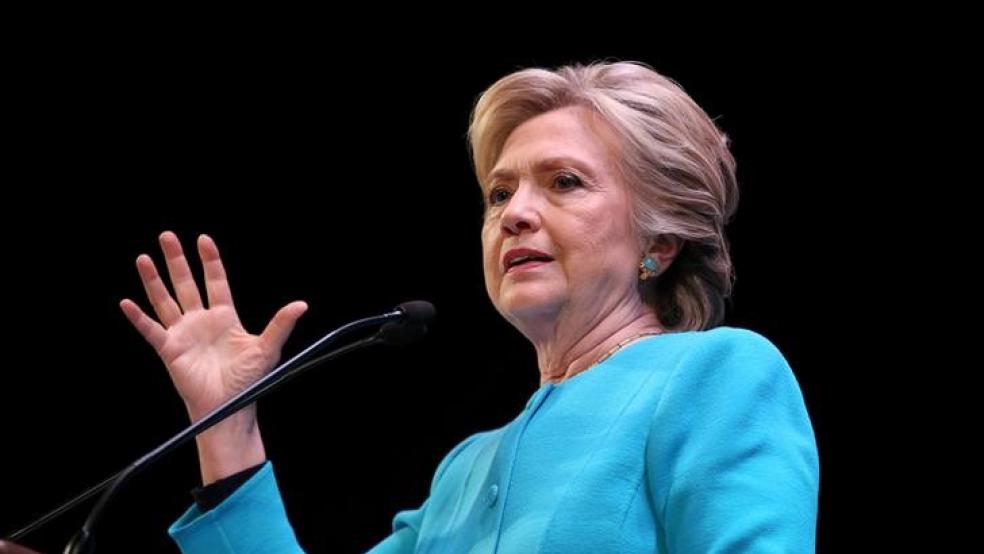The modern Democratic Party has had a potent anti-war wing since Eugene McCarthy called for a swift withdrawal from Vietnam during the 1968 primary. Democratic anti-war highlights in this millennium include California Rep. Barbara Lee’s opposition to the 2001 Afghanistan invasion, the 126 House Democratic votes against the Iraq War resolution in 2002 and Howard Dean’s 2004 campaign.
Unfortunately, Hillary Clinton does not follow in this tradition, leaving Democrats who want to “give peace a chance” a difficult choice in November.
Clinton would succeed an Obama administration that did not start any new, large-scale ground wars and wound down the ones initiated by his predecessor. Obama also delivered progress on Cuba and Iran, but disappointed many, especially on the left, by intensifying drone warfare, bombing Libya and entertaining regime change in Syria. Peace movement expectations of Obama were too high, failing to take into account that every modern president’s discretion is limited by the deep state — a collection of financial and defense industry interests, think-tank experts and government officials who shape public policy largely outside of public view.
Related: Why Julian Assange Could Be Hillary Clinton’s Biggest Problem
While Obama may not have earned his 2009 Nobel Peace Prize, he was far better than his recent predecessors — and likely far better than a President Hillary Clinton or Donald Trump would be. George W. Bush’s failures remain top of mind, but we should not forget Bill Clinton’s bombing campaigns against Iraq and Serbia or his 1998 missile attack against a medicine factory in Sudan that diverted attention from his impeachment trial.
Obama’s preference for peace and diplomacy is not echoed by either of the two major party candidates. Donald Trump routinely decries Obama’s supposed weakness, calls for bombing the “s—t” out of ISIS and advocates a military buildup.
On the other hand, Trump has spoken out against nation building and subsidizing the defense of NATO and Pacific allies — though on Monday he said he had changed his mind about NATO’s obsolescence and that he would work with that group of nations to defeat ISIS.
Related: Why Trump Could Be a Problem for Republicans Long After He’s Gone
ISIS aside, some of Trump’s other foreign policy statements have given Clinton an opportunity to run to his right on foreign policy. And her track record suggests she’s more comfortable there anyway. Her 2002 Senate vote for the Iraq War may be old news, but it still matters. And her 2011 push for regime change in Libya is even worse. By then, the U.S. already had two failed regime change projects in Iraq and Afghanistan, but apparently Clinton hadn’t received the memo. As an indication of just how rooted the former secretary of state remains in establishment foreign policy thinking, Politico reported recently that the Clinton campaign is seeking endorsements from Republican foreign policy elders such as Henry Kissinger and Condoleezza Rice.
While these endorsements have yet to be secured, Hillary’s tilt toward militarism has been rewarded by support from a number of neoconservatives and other national security oriented Republicans. In May, Max Boot — a contributing editor to the neocon Weekly Standard — wrote, “Clinton would be far preferable to Trump” calling her “a centrist Democrat who is more hawkish than President Obama.” Another neocon, Robert Kagan, recently spoke at a Clinton fundraiser. Kagan’s wife, Victoria Nuland, worked for Clinton in the State Department and went on to play a leading role in the removal of Ukrainian President Victor Yanukovych.
Related: This Is Why Vladimir Putin Wants Trump in the Oval Office
Yanukovych appears to have been highly corrupt and a pawn of Vladimir Putin, but at the same time, he was the elected leader of the former Soviet republic. America’s role in the extra-constitutional removal of his government and its replacement with an anti-Moscow regime was seen as a provocation in Russia. Ukraine shares a long border and a long history of interaction with Russia, so it is not surprising that Putin has taken aggressive steps to maintain a buffer zone on Ukrainian soil. Rather than de-escalate the situation, neocon hawks moving into Clinton’s camp demand retaliatory measures for Russia’s annexation of Crimea and its arming of irredentist forces in eastern Ukraine.
A reasonable response by Americans tired of endless war is to ask why we should get involved. Ukraine is not a member of NATO, nor is it a major trading partner. It was also part of the Russian Empire or the Soviet Union for hundreds of years, and yet somehow we survived.
Trump and his allies who would like to see better relations with Russia are being pilloried by the hawks for disloyalty to the United States. These militarists ignore the fact that the Cold War ended 25 years ago and there is no longer much reason to treat Russia as an existential threat.
Related: The Top 15 Military Spenders in the World
Unnecessary hostility toward Russia also complicates the U.S. position in Syria. In order to stick it to Russia and maintain our disastrous regime-change strategy, defense hawks insist on opposing the admittedly brutal Assad regime and supporting terrorist groups linked to al-Qaeda. The U.S. policy of arming unreliable opposition groups in Syria started during Clinton’s time at the State Department and enjoyed her active support.
Similarly, interventionists entering Clinton’s orbit could manufacture a crisis with China, which has been claiming islands and resource rights in the South China Sea, putting it at odds with Vietnam, the Philippines and other neighboring states. As secretary of state, Clinton staked out a strong position against China on this issue during a 2011 speech in Hanoi.
As with the Ukraine situation, the South China Sea dispute is thousands of miles away from U.S. shores and Americans have no compelling interest in its outcome. In both cases, an overly aggressive stance by Clinton could result in heightened tensions, proxy conflicts or even another Cold War that would serve no purpose besides feeding the military-industrial complex.
Related: US Marines Really Don’t Want Clinton as Their Commander-in-Chief
Democrats supporting Clinton are thus opening the door to dubious confrontations with Russia, China, Syria and any other regimes not meeting the former secretary’s standards of conduct. This is a recipe for conflict that anti-war voters will find hard to swallow. Since Trump is beyond the pale, peaceniks will need to look at Gary Johnson or Jill Stein this cycle. Johnson has adopted the non-interventionist position that is a core plank of the Libertarian Party platform, while Stein proposes a 50 percent reduction in U.S. military spending.
Although these third party candidates probably can’t prevent an almost inevitable Clinton presidency, votes for them set a marker for 2020 or 2024. Perhaps by then Democrats will return to their senses and offer us a presidential candidate who will stand up to the deep state and demand an end to endless war.






